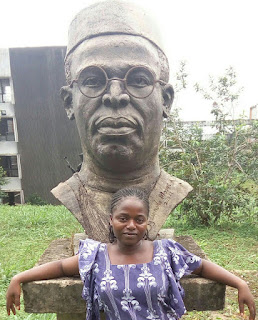The Pulley!
God is God. He is the same before the beginning of the universe, since the existence of the universe, now and forever. What can we do without God? The All-knowing is indispensable. The Supreme Being remains our primary need, through which all other known or unknown needs are met. The omnipresence and omnipotence of His Excellency guarantee us confidence and hope, as well as progress, joy and fulfillment in life.
I have tried as much as possible to capture the nature of the thought(s) that pops up in the mind of one of the most renowned, metaphysical poets, George Herbert, which prompts him to write 'The Pulley', a poem arranged in twenty lines, that presents an individual, well articulated thought on why divine creation is deliberately designed to let humans live lives blessed with worldly riches but devoid of rest. I have been able to draw hot conclusions from the poet's frank stand, as inspired by concrete, Bible stories, that the denial of rest is a perfect means to ensure that humans are perpetually dependent on God for it, especially, in the last resort, when everything else fails to quench their restlessness.
Jonah fails in his bid to shun God and earn a historic success, as he is made to embark on a horrible, three day excursion by the same God, in the stomach of a very big fish, internally, technically structured with too many bones and virtually no accommodation for an uncrushed human being. While he is in the extremely boiling ring, a really horrified prodigal servant, he apologises countlessly for his disobedience and stubbornness, and promises God heaven and earth, as he is too traumatised to remember that the two places are created by the same God. An avid Bible reader knows what he does the moment he returns. In case you do not know, he surrenders to God's will immediately and rushes to Nineveh to deliver God's prophetic message to its inhabitants.
Hannah is just a perfect lady, even in the sight of God. But she is denied a child for so long by the same God that she is, at last, forced to pledge to dedicate a first child given to her to the same God entirely. Guess what happens next. The following intercourse she has with her man becomes fruitful. God plants in her, a seed that develops beautifully, progressively and healthily for nine months. He gives her a bouncing baby boy, Samuel, who she actually gives back to Him in appreciation of His kindness to her.
Sarah's case is worse. God shut her womb so tight that no child can access it. She makes a controversial subject in her vibrant years. But as she outgrows the child bearing age, hers becomes more of a dead case, whose prospect of becoming a mother in life is not worth deliberating upon. After she longs for a rest from the restlessness, the stigma of being a barren woman in vain for too long, she gives up on herself, even deeper than her world does on her. She remains in the hopelessly shattered mood, until a period in old age, that God, in His infinite mercies, blesses her with an eternal shocker, a mysterious miracle and an unparalleled wonder in the shape of a bouncing baby boy, Isaac. (But why a boy again, why not a girl this time? Isn't this partial?Hmmmmn.) And Trust God. He is still the same God in every situation.
George Herbert might have experienced a situation, similar to that of Jonah, Hannah or Sarah, to have concluded that a divinely inspired deprivation is God's way of having humans in his pocket, around him and at his beck and call always. This accusation is weighty and thought provoking.
But wait. Is George's accusation of the King of Kings right? Does his view see what I am seeing? Can it be influenced to think what I am thinking right now? George, Bukola has a personal message for you. I am supposed to tell you now, but I have decided to tell you next time. Until then, stay calm, George. I urge my distinguished readers to patiently look forward to the next piece, too. Hope you have great times ahead. Cheers!




Comments